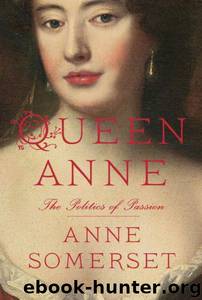Queen Anne: The Politics of Passion by Anne Somerset

Author:Anne Somerset [Somerset, Anne]
Language: eng
Format: epub
Tags: Biography & Autobiography, Great Britain, Historical, History, Nonfiction, Retail, Royalty
ISBN: 9780307962881
Google: ZsmNffLx1OEC
Amazon: 0307962881
Barnesnoble: 0307962881
Publisher: Knopf
Published: 2013-10-15T04:00:00+00:00
The Whigs hoped to receive some redress when a new Bishop of Exeter was named, and after the Bishop of Chester died in early 1707 they assumed that he too would be replaced with someone of whom they approved. Another important ecclesiastical position became vacant upon the death of the Regius Professor of Divinity at Oxford. The University wanted him to be replaced by his deputy, Dr Smallridge, and Anne herself was known to favour the latter’s candidacy. However, before leaving England to go on campaign in March 1707 the Duke of Marlborough urged her to give the post to Dr John Potter, who would be agreeable to the Whigs.
Although Godolphin had warned her that she could not afford to displease the Whigs, the Queen refused to be constrained by this. ‘Without ever acquainting her Prime Minister with her intention’, she summoned Dr Offspring Blackall and asked whether he would prefer to be made Bishop of Exeter or Chester. After he opted for Exeter, she offered the See of Chester to a protégé of the Archbishop of York named William Dawes. Knowing that this was bound to cause controversy, she told both men that their promotion would not be announced for some months, but she considered herself to have made an irrevocable commitment.4
The Duchess of Marlborough would later admit ‘there is no doubt but the Queen had a right to dispose of vacant bishoprics’, but she maintained that ‘nothing of this is ever done without the advice of the chief minister’. She alleged that Anne only decided to defy Godolphin on the matter because she was being guided by secret advisers who filled her head with ‘notions of the high prerogative … and … of being Queen indeed’. She had to concede, however, that others were shocked by the ministers’ attempts to limit Anne’s freedom of choice, and that this was ‘interpreted by the world and resented by [Anne] herself as hard usage, a denial of common civility, and even the making her no Queen’.5
Despite Sarah seeking to portray Anne’s choice of new bishops as appallingly provocative, Anne herself insisted that ‘all the clamour that is raised against them proceeds only from the malice of the Whigs’. Marlborough was offended that the Queen did not accept his recommendation, and complained that it showed he had lost his credit with her, but it is understandable that Anne did not welcome interference from one who admitted to having ‘little acquaintance among the clergy’.6 She also found it galling that Lords Wharton and Somers, both of whom were notorious for irregular private lives, should expect to be deferred to on this question.
Download
This site does not store any files on its server. We only index and link to content provided by other sites. Please contact the content providers to delete copyright contents if any and email us, we'll remove relevant links or contents immediately.
| Military | Political |
| Presidents & Heads of State | Religious |
| Rich & Famous | Royalty |
| Social Activists |
Waking Up in Heaven: A True Story of Brokenness, Heaven, and Life Again by McVea Crystal & Tresniowski Alex(37046)
Empire of the Sikhs by Patwant Singh(22214)
We're Going to Need More Wine by Gabrielle Union(18118)
Hans Sturm: A Soldier's Odyssey on the Eastern Front by Gordon Williamson(17060)
Leonardo da Vinci by Walter Isaacson(11962)
The Radium Girls by Kate Moore(10957)
Educated by Tara Westover(7103)
Tools of Titans by Timothy Ferriss(7011)
How to Be a Bawse: A Guide to Conquering Life by Lilly Singh(6734)
The Last Black Unicorn by Tiffany Haddish(5100)
Permanent Record by Edward Snowden(5044)
The Rise and Fall of Senator Joe McCarthy by James Cross Giblin(4864)
Promise Me, Dad by Joe Biden(4487)
The Wind in My Hair by Masih Alinejad(4450)
The Crown by Robert Lacey(4135)
A Higher Loyalty: Truth, Lies, and Leadership by James Comey(4068)
The Iron Duke by The Iron Duke(3672)
Joan of Arc by Mary Gordon(3289)
How to be Champion: My Autobiography by Sarah Millican(3208)
